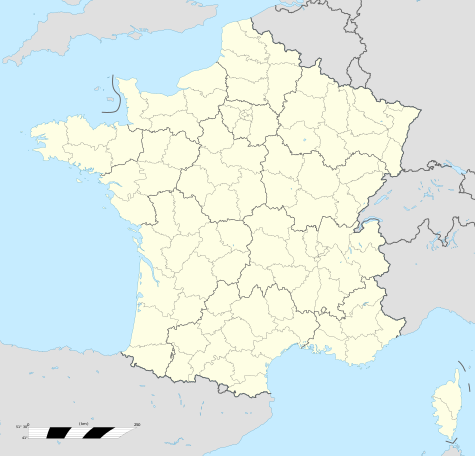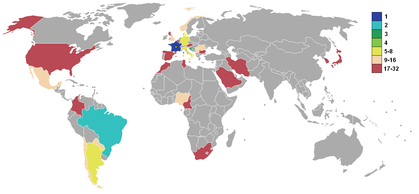1998 FIFA World Cup
 From Wikipedia the free encyclopedia
From Wikipedia the free encyclopedia
| Coupe du Monde – France 98 (French) | |
|---|---|
 | |
| Tournament details | |
| Host country | France |
| Dates | 10 June – 12 July |
| Teams | 32 (from 5 confederations) |
| Venue(s) | 10 (in 10 host cities) |
| Final positions | |
| Champions | |
| Runners-up | |
| Third place | |
| Fourth place | |
| Tournament statistics | |
| Matches played | 64 |
| Goals scored | 171 (2.67 per match) |
| Attendance | 2,785,100 (43,517 per match) |
| Top scorer(s) | |
| Best player(s) | |
| Best young player | |
| Best goalkeeper | |
| Fair play award | |
The 1998 FIFA World Cup was the 16th FIFA World Cup, the football world championship for men's national teams. The finals tournament was held in France from 10 June to 12 July 1998. The country was chosen as the host nation by FIFA for the second time in the history of the tournament (the first was in 1938), defeating Morocco in the bidding process. It was the ninth time that it was held in Europe. Spanning 32 days, it was the longest World Cup tournament ever held.
Qualification for the finals began in March 1996 and concluded in November 1997. For the first time in the competition, the group stage was expanded from 24 teams to 32, with eight groups of four. 64 matches were played in 10 stadiums in 10 host cities, with the opening match and final staged at the newly built Stade de France in the Parisian commune of Saint-Denis.
The tournament was won by host country France, who beat defending champions Brazil 3–0 in the final. France won their first title, becoming the seventh nation to win a World Cup, and the sixth (after Uruguay, Italy, England, West Germany and Argentina) to win the World Cup on home soil. As of 2022, they are the most recent team to win the tournament on home soil. Croatia, Jamaica, Japan and South Africa made their first appearances in the finals.
Host selection[edit]
France was awarded the 1998 World Cup on 2 July 1992 by the executive committee of FIFA during a general meeting in Zürich, Switzerland. They defeated Morocco by 12 votes to 7.[1][2] Switzerland withdrew, due to being unable to meet FIFA's requirements. This made France the third country to host two World Cups, after Mexico and Italy in 1986 and 1990 respectively. France previously hosted the third edition of the World Cup in 1938. England, who hosted the competition in 1966 and won it, were among the original applicants, but later withdrew their application in favour of an ultimately successful bid to host UEFA Euro 1996.
| Voting results[3] | |||
|---|---|---|---|
| Country | Round 1 | ||
| France | 12 | ||
| Morocco | 7 | ||
Bribery and corruption investigations[edit]
On 4 June 2015, while co-operating with the FBI and the Swiss authorities, Chuck Blazer confirmed that he and other members of FIFA's executive committee were bribed during the 1998 and 2010 World Cups host selection process. Blazer stated that "we facilitated bribes in conjunction with the selection of the host nation for the 1998 World Cup". Since France won the selection process it was initially thought the bribery came from its bid committee. It eventually transpired that the bribe payment was from the failed Moroccan bid.[4][5][6]
Qualification[edit]
The qualification draw for the 1998 World Cup finals took place in the Musée du Louvre, Paris on 12 December 1995.[7] As tournament hosts, France was exempt from the draw as was defending champion Brazil, but it was also France's first World Cup since 1986. 174 teams from six confederations participated, 24 more than in the previous round. Fourteen countries qualified from the European zone (in addition to hosts France). Ten were determined after group play – nine group winners and the best second-placed team; the other eight group runners-up were drawn into pairs of four play-off matches with the winners qualifying for the finals as well.[8] CONMEBOL (South America) and CAF (Africa) were each given five spots in the final tournament, while three spots were contested between 30 CONCACAF members in the North and Central America and the Caribbean zone. The winner of the Oceanian zone advanced to an intercontinental play-off against the runner-up of the Asian play-off, determined by the two best second-placed teams.
Four nations qualified for the first time: Croatia, Jamaica, Japan and South Africa. The last team to qualify was Iran by virtue of beating Australia in a two-legged tie on 29 November 1997.[9] It marked their first appearance in the finals since 1978, the last time Tunisia also qualified for the tournament. Chile qualified for the first time since 1982, after serving a ban that saw them miss out on the two previous tournaments. Paraguay and Denmark returned for the first time since 1986. Austria, England, Scotland and Yugoslavia returned after missing out on the 1994 tournament, with the Balkan team now appearing under the name of FR Yugoslavia. Among the teams who failed to qualify were two-time winners Uruguay (for the second successive tournament); Portugal (their last absence as of 2022); Sweden, who finished third in 1994; Russia (who failed to qualify for the first time since 1978 after losing to Italy in the play-off round); and the Republic of Ireland, who had qualified for the previous two tournaments.[10] The highest-ranked team not to qualify was the UEFA Euro 1996 runners-up the Czech Republic (ranked 3rd), while the lowest-ranked team that did qualify was Nigeria (ranked 74th).
As of 2022, this was the last time Austria, Bulgaria, Norway, Romania and Scotland qualified for a FIFA World Cup finals, and the only time Jamaica have qualified.
List of qualified teams[edit]
The following 32 teams, shown with final pre-tournament rankings,[11] qualified for the final tournament.
|
|
|  Countries qualified for World Cup Country did not qualify Countries that did not enter World Cup Country not a FIFA member
|
| Teams listed by FIFA ranking as of May 1998[11] | |||
|---|---|---|---|
| Country | Confederation | Rank | |
| 1 | CONMEBOL | 1 | |
| 2 | UEFA | 2 | |
| 3 | CONCACAF | 4 | |
| 4 | UEFA | 5 | |
| 5 | CONMEBOL | 6 | |
| 6 | UEFA | 7 | |
| 7 | UEFA | 8 | |
| 8 | CONMEBOL | 9 | |
| 9 | CONMEBOL | 10 | |
| 10 | CONCACAF | 11 | |
| 11 | AFC | 12 | |
| 12 | CAF | 13 | |
| 13 | UEFA | 14 | |
| 14 | UEFA | 15 | |
| 15 | UEFA | 18 | |
| 16 | UEFA | 19 | |
| 17 | AFC | 20 | |
| 18 | CAF | 21 | |
| 19 | UEFA | 22 | |
| 20 | CAF | 24 | |
| 21 | UEFA | 25 | |
| 22 | UEFA | 27 | |
| 23 | CONMEBOL | 29 | |
| 24 | CONCACAF | 30 | |
| 25 | UEFA | 31 | |
| 26 | AFC | 34 | |
| 27 | UEFA | 35 | |
| 28 | UEFA | 36 | |
| 29 | UEFA | 41 | |
| 30 | AFC | 42 | |
| 31 | CAF | 49 | |
| 32 | CAF | 74 | |
Venues[edit]
France's bid to host the World Cup centered on a national stadium with 80,000 seats and nine other stadiums located across the country.[12] When the finals were originally awarded in July 1992, none of the regional club grounds were of a capacity meeting FIFA's requirements – namely being able to safely seat 40,000.[12] The proposed national stadium, colloquially referred to as the 'Grand stade', met with controversy at every stage of planning; the stadium's location was determined by politics, finance and national symbolism.[13] As Mayor of Paris, Jacques Chirac successfully negotiated a deal with Prime Minister Édouard Balladur to bring the Stade de France, as it was now called, to the commune of Saint-Denis just north of the capital city.[13] Construction on the stadium started in December 1995 and was completed after 26 months of work in November 1997 at a cost of ₣2.67 billion.[14]
The choice of stadium locations was drafted from an original list of 14 cities.[15] FIFA and CFO monitored the progress and quality of preparations, culminating in the former providing final checks of the grounds weeks before the tournament commenced. Montpellier was the surprise inclusion from the final list of cities because of its low urban hierarchy in comparison to Strasbourg, who boasted a better hierarchy and success from its local football team, having been taken over by a consortium. Montpellier however was considered ambitious by the selecting panel to host World Cup matches. The local city and regional authorities in particular had invested heavily into football the previous two decades and were able to measure economic effects, in terms of jobs as early as in 1997.[16] Some of the venues used for this tournament were also used for the previous World Cup in France in 1938. The Stade Vélodrome in Marseille, the Stade Municipal in Toulouse, the Gerland in Lyon, the Parc Lescure in Bordeaux and the Parc des Princes in Paris received the honour of hosting World Cup matches once again in 1998 as they had all done in 1938.
10 stadiums were used for the finals; in addition to nine matches being played at the Stade de France (the most used stadium in the tournament), a further six matches took place in Paris Saint-Germain's Parc des Princes, bringing Paris's total matches hosted to 15. France played four of their seven matches in the national stadium; they also played in the country's second and third largest cities, Marseille (hosting 7 total matches) and Lyon (hosting 6 total matches), as well as a Round of 16 knockout match in the northern city of Lens (also hosting 6 total matches). Nantes, Toulouse, Bordeaux, Montpellier and Saint-Etienne also hosted 6 matches in total; all of the stadiums used also hosted knockout round matches.
| Paris (Saint-Denis) | Marseille | Paris | Lyon |
|---|---|---|---|
| Stade de France | Stade Vélodrome | Parc des Princes | Stade de Gerland |
| 48°55′28″N 2°21′36″E / 48.92444°N 2.36000°E | 43°16′11″N 5°23′45″E / 43.26972°N 5.39583°E | 48°50′29″N 2°15′11″E / 48.84139°N 2.25306°E | 45°43′26″N 4°49′56″E / 45.72389°N 4.83222°E |
| Capacity: 80,000 | Capacity: 60,000 | Capacity: 48,875 | Capacity: 44,000 |
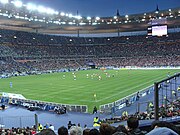 |  |  | 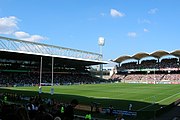 |
| Lens | |||
| Stade Félix-Bollaert | |||
| 50°25′58.26″N 2°48′53.47″E / 50.4328500°N 2.8148528°E | |||
| Capacity: 41,300 | |||
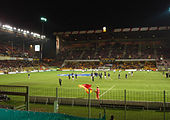 | |||
| Nantes | |||
| Stade de la Beaujoire | |||
| 47°15′20.27″N 1°31′31.35″W / 47.2556306°N 1.5253750°W | |||
| Capacity: 39,500 | |||
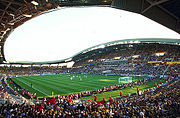 | |||
| Toulouse | Saint-Étienne | Bordeaux | Montpellier |
| Stadium de Toulouse | Stade Geoffroy-Guichard | Parc Lescure | Stade de la Mosson |
| 43°34′59.93″N 1°26′2.57″E / 43.5833139°N 1.4340472°E | 45°27′38.76″N 4°23′24.42″E / 45.4607667°N 4.3901167°E | 44°49′45″N 0°35′52″W / 44.82917°N 0.59778°W | 43°37′19.85″N 3°48′43.28″E / 43.6221806°N 3.8120222°E |
| Capacity: 37,000 | Capacity: 36,000 | Capacity: 35,200 | Capacity: 34,000 |
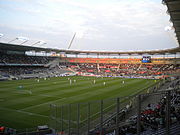 | 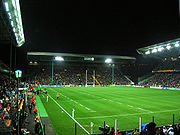 |  | 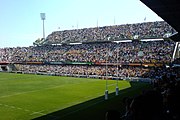 |
Innovations[edit]
Technologies[edit]
This was the first FIFA World Cup where fourth officials used electronic boards, instead of cardboard.[17]
Rule changes[edit]
This was the first World Cup since the introduction of golden goals,[17] banning of tackles from behind that endanger the safety of an opponent[18] and allowance of three substitutions per game.[19]
Match officials[edit]
34 referees and 33 assistants officiated in the 1998 World Cup.[20] As a result of the extension to 32 teams in the finals, there was an increase of 10 referees and 11 officials from the 1994 World Cup.[20]
- UEFA (15)
Draw[edit]
The FIFA Organising Committee announced the eight seeded teams on 3 December 1997. The historic tradition to seed the hosts (France) and holders (Brazil) was upheld; while the remaining six seeds were granted for the other top7-ranked teams, based on their results obtained in the last three FIFA World Cups (ratio 3:2:1, counting in total 60%) and their FIFA World Ranking position in the last month of the past three years (equal ratio, counting in total 40%).[21][22]
For the draw, the 32 teams were allocated into four pots. The eight top-seeded teams were allocated in pot A and would be drawn/selected into the first position of the eight groups playing in the group stage. The remaining 24 unseeded teams were allocated into three pots based on geographical sections, with the: Nine European teams in pot B; four Asian teams and three South American teams in pot C; five African teams and three North American teams in pot D.[23]
The general principle was to draw one team from each pot into the eight groups, although with special combined procedures for pot B and pot C, due to comprising more/less than eight teams - but sixteen teams in total. At the same time, the draw also needed to respect the geographical limitation, that each group could not feature more than one team from each confederation, except for the European teams where the limitation was maximum two per group.[23]
| Pot A Top-seeded teams (DC + Host + Top7 seeds) | Pot B Europe (UEFA) | Pot C Asia & South America (AFC & CONMEBOL) | Pot D Africa & North America (CAF & CONCACAF) |
|---|---|---|---|
- The draw took place at Stade Vélodrome in Marseille, and was televised live on 4 December 1997: FIFA World Cup Draw on BBC Sport.
For the first time in history, the draw event took place in a football stadium, with 38,000 spectators and an estimated 1 billion TV viewers. The draw was officiated by FIFA secretary general Sepp Blatter. Teams were drawn by football legends Franz Beckenbauer, Carlos Alberto Parreira, George Weah and Raymond Kopa.[24]
Organiser Michel Platini, who later became president of UEFA, admitted in 2018 that the draw for the group stage of the competition had been fixed so that France and Brazil were kept apart until the final, telling France Bleu Sport: "We did a bit of trickery. When we were organising the schedule. We did not spend six years organising the World Cup to not do some little shenanigans".[25]
The statement from Platini referred to the fact that, shortly before the World Cup finals draw took place, the FIFA Organising Committee had met to finalise the draw process. At this meeting, the committee had approved the proposal to assign host nation France to group position C1 and defending champions Brazil to group position A1 ahead of the draw. As the tournament structure was also predetermined so that the winners of Groups A, D, E and H, and the runners-up of Groups B, C, F and G would be kept apart from the group winners of B, C, F and G, and the runners-up of Group A, D, E and H until the final; thus, France and Brazil could avoid meeting each other until the final if both teams finished in the same position in the top two of their respective groups.[26]
Procedure for the draw:[23]
- Pot A was used to draw the remaining six top-seeded teams for the first position of groups B, D, E, F, G and H.
- Pot D was used to draw one team to each of the eight groups (drawing in the alphabetic order from A to H).
- Pot B was used to draw one team to each of the eight groups (drawing in the alphabetic order from A to H).
- As per the FIFA rule of only allowing a maximum of two UEFA teams in each group, the remaining ninth team from Pot B, was subject to a second draw, to be put in either of the groups containing a top-seeded South American (CONMEBOL) team.
- Pot C was used to draw one team to each of the seven groups with an empty spot (drawing in alphabetical order from A to H). However, as each group could only contain one South American (CONMEBOL) team, the first Asian (AFC) team drawn would not be drawn into a group in alphabetical order, but instead be drawn into the remaining open group with a top-seeded South American (CONMEBOL) team.
- To decide the match schedules, the exact group position number for the un-seeded teams in each group (2, 3 or 4), were also drawn immediately from eight special group bowls, after each respective team had been drawn from pot D, B and C.
Draw results and group fixtures[edit]
The draw resulted in the following eight groups:[23]
|
|
|
|
|
|
|
|
In each group, the teams played three matches, one against each of the other teams. Three points were awarded for each win, while a draw was worth one point. After completion of the group stage, the two teams with the most points in each group would advance to the knockout stage, with each group winner facing the runner-up from one of the other groups in the round of 16. This was a new format for the World Cup, following the expansion from 24 teams in 1994. A total of 64 games were played, including the final and a third-place play-off between the losers of the two semi-finals.
The fixtures for the group stage were decided based on the draw results, as follows:
| Matchday | Dates | Matches |
|---|---|---|
| Matchday 1 | 10–15 June 1998 | 1 v 2, 3 v 4 |
| Matchday 2 | 16–22 June 1998 | 1 v 3, 2 v 4 |
| Matchday 3 | 23–26 June 1998 | 4 v 1, 2 v 3 |
Squads[edit]
As with the preceding tournament, each team's squad for the 1998 World Cup finals consisted of 22 players. Each participating national association had to confirm their final 22-player squad by 1 June 1998.
Out of the 704 players participating in the 1998 World Cup, 447 were signed up with a European club; 90 in Asia, 67 in South America, 61 in Northern and Central America and 37 in Africa.[27] 75 played their club football in England – five more than Italy and Spain. Barcelona of Spain was the club contributing to the most players in the tournament with 13 players on their side.[27]
The average age of all teams was 27 years, 8 months – five months older than the previous tournament.[28] Samuel Eto'o of Cameroon was the youngest player selected in the competition at 17 years, 3 months, while the oldest was Jim Leighton of Scotland at 39 years, 11 months.[28]
Group stage[edit]
All times are Central European Summer Time (UTC+2)
| Key for tables |
|---|
|
Group A[edit]
Defending champions Brazil won Group A after only two matches as the nation achieved victories over Scotland (2–1) and Morocco (3–0). Heading into the third game, Brazil had nothing to play for but still started its regulars against Norway, who was looking to upset Brazil once again. Needing a victory, Norway overturned a 1–0 deficit with 7 minutes remaining to defeat Brazil 2–1, with Kjetil Rekdal scoring[29] the winning penalty to send Norway into the knockout stage for the first time.[30]
Norway's victory denied Morocco a chance at the Round of 16, despite winning 3–0 against Scotland. It was only Morocco's second ever victory at a World Cup, having recorded its first previous win 12 years earlier on 11 June 1986.
Scotland managed only one point, coming in a 1–1 draw against Norway, and failed to get out of the first round for an eighth time in the FIFA World Cup, a record that stands to this date.
| Pos | Team | Pld | W | D | L | GF | GA | GD | Pts | Qualification |
|---|---|---|---|---|---|---|---|---|---|---|
| 1 | 3 | 2 | 0 | 1 | 6 | 3 | +3 | 6 | Advance to knockout stage | |
| 2 | 3 | 1 | 2 | 0 | 5 | 4 | +1 | 5 | ||
| 3 | 3 | 1 | 1 | 1 | 5 | 5 | 0 | 4 | ||
| 4 | 3 | 0 | 1 | 2 | 2 | 6 | −4 | 1 |
Group B[edit]
Italy and Chile progressed to the second round, while Austria failed to win for the first time since 1958 and Cameroon failed to get out of the group stage for the second time in a row.
| Pos | Team | Pld | W | D | L | GF | GA | GD | Pts | Qualification |
|---|---|---|---|---|---|---|---|---|---|---|
| 1 | 3 | 2 | 1 | 0 | 7 | 3 | +4 | 7 | Advance to knockout stage | |
| 2 | 3 | 0 | 3 | 0 | 4 | 4 | 0 | 3 | ||
| 3 | 3 | 0 | 2 | 1 | 3 | 4 | −1 | 2 | ||
| 4 | 3 | 0 | 2 | 1 | 2 | 5 | −3 | 2 |
Group C[edit]
France, the host nation, swept Group C when the start of their path to their first FIFA World Cup trophy culminated with their 2–1 win over Denmark, who despite their loss, progressed to the second round. Saudi Arabia, after a good performance four years earlier, finished bottom with only one point. Debutant South Africa grabbed two points and also exited at the group stage.
| Pos | Team | Pld | W | D | L | GF | GA | GD | Pts | Qualification |
|---|---|---|---|---|---|---|---|---|---|---|
| 1 | 3 | 3 | 0 | 0 | 9 | 1 | +8 | 9 | Advance to knockout stage | |
| 2 | 3 | 1 | 1 | 1 | 3 | 3 | 0 | 4 | ||
| 3 | 3 | 0 | 2 | 1 | 3 | 6 | −3 | 2 | ||
| 4 | 3 | 0 | 1 | 2 | 2 | 7 | −5 | 1 |
| Saudi Arabia | 0–1 | |
|---|---|---|
| Report | Rieper |
| South Africa | 1–1 | |
|---|---|---|
| McCarthy | Report | A. Nielsen |
| South Africa | 2–2 | |
|---|---|---|
| Bartlett | Report | Al-Jaber Al-Thunayan |
Group D[edit]
Nigeria and Paraguay advanced to the Round of 16 after a surprise elimination of top seed Spain, while Bulgaria failed to repeat their surprise performance from the previous tournament.
| Pos | Team | Pld | W | D | L | GF | GA | GD | Pts | Qualification |
|---|---|---|---|---|---|---|---|---|---|---|
| 1 | 3 | 2 | 0 | 1 | 5 | 5 | 0 | 6 | Advance to knockout stage | |
| 2 | 3 | 1 | 2 | 0 | 3 | 1 | +2 | 5 | ||
| 3 | 3 | 1 | 1 | 1 | 8 | 4 | +4 | 4 | ||
| 4 | 3 | 0 | 1 | 2 | 1 | 7 | −6 | 1 |
| Spain | 6–1 | |
|---|---|---|
| Hierro Luis Enrique Morientes Bachev Kiko | Report | Kostadinov |
Group E[edit]
The Netherlands and Mexico advanced with the same record, with the former placing first on goal difference. Belgium and eventual 2002 FIFA World Cup co-hosts South Korea failed to advance.
| Pos | Team | Pld | W | D | L | GF | GA | GD | Pts | Qualification |
|---|---|---|---|---|---|---|---|---|---|---|
| 1 | 3 | 1 | 2 | 0 | 7 | 2 | +5 | 5 | Advance to knockout stage | |
| 2 | 3 | 1 | 2 | 0 | 7 | 5 | +2 | 5 | ||
| 3 | 3 | 0 | 3 | 0 | 3 | 3 | 0 | 3 | ||
| 4 | 3 | 0 | 1 | 2 | 2 | 9 | −7 | 1 |
| South Korea | 1–3 | |
|---|---|---|
| Ha Seok-ju | Report | Peláez Hernández |
| Netherlands | 0–0 | |
|---|---|---|
| Report |
| Netherlands | 5–0 | |
|---|---|---|
| Cocu Overmars Bergkamp Van Hooijdonk R. de Boer | Report |
| Netherlands | 2–2 | |
|---|---|---|
| Cocu R. de Boer | Report | Peláez Hernández |
| Belgium | 1–1 | |
|---|---|---|
| Nilis | Report | Yoo Sang-chul |
Group F[edit]
Germany and the Federal Republic of Yugoslavia advanced, each with 7 points (Germany took 1st through goal differential tiebreak). Iran and 1994 host United States failed to advance.
| Pos | Team | Pld | W | D | L | GF | GA | GD | Pts | Qualification |
|---|---|---|---|---|---|---|---|---|---|---|
| 1 | 3 | 2 | 1 | 0 | 6 | 2 | +4 | 7 | Advance to knockout stage | |
| 2 | 3 | 2 | 1 | 0 | 4 | 2 | +2 | 7 | ||
| 3 | 3 | 1 | 0 | 2 | 2 | 4 | −2 | 3 | ||
| 4 | 3 | 0 | 0 | 3 | 1 | 5 | −4 | 0 |
| FR Yugoslavia | 1–0 | |
|---|---|---|
| Mihajlović | Report |
| Germany | 2–0 | |
|---|---|---|
| Möller Klinsmann | Report |
| Germany | 2–2 | |
|---|---|---|
| Mihajlović Bierhoff | Report | Mijatović Stojković |
| United States | 1–2 | |
|---|---|---|
| McBride | Report | Estili Mahdavikia |
Group G[edit]
Romania topped the group over England, while Colombia and Tunisia were unable to reach the last 16, despite Colombia having one win.
| Pos | Team | Pld | W | D | L | GF | GA | GD | Pts | Qualification |
|---|---|---|---|---|---|---|---|---|---|---|
| 1 | 3 | 2 | 1 | 0 | 4 | 2 | +2 | 7 | Advance to knockout stage | |
| 2 | 3 | 2 | 0 | 1 | 5 | 2 | +3 | 6 | ||
| 3 | 3 | 1 | 0 | 2 | 1 | 3 | −2 | 3 | ||
| 4 | 3 | 0 | 1 | 2 | 1 | 4 | −3 | 1 |
Group H[edit]
Argentina finished at the top of Group H against three debutants. Croatia took the runners up spot against the surprising Jamaica, and Japan failed to advance.
| Pos | Team | Pld | W | D | L | GF | GA | GD | Pts | Qualification |
|---|---|---|---|---|---|---|---|---|---|---|
| 1 | 3 | 3 | 0 | 0 | 7 | 0 | +7 | 9 | Advance to knockout stage | |
| 2 | 3 | 2 | 0 | 1 | 4 | 2 | +2 | 6 | ||
| 3 | 3 | 1 | 0 | 2 | 3 | 9 | −6 | 3 | ||
| 4 | 3 | 0 | 0 | 3 | 1 | 4 | −3 | 0 |
Knockout stage[edit]
The knockout stage comprised the 16 teams that advanced from the group stage of the tournament. For each game in the knockout stage, any draw at 90 minutes was followed by 30 minutes of extra time; if scores were still level, there was a penalty shoot-out to determine who progressed to the next round. Golden goal comes into play if a team scores during extra time, thus becoming the winner which concludes the game.
Bracket[edit]
The first games were played on 27 June 1998, and the final took place on 12 July 1998 in Paris.
| Round of 16 | Quarter-finals | Semi-finals | Final | |||||||||||
| 27 June – Paris | ||||||||||||||
| 4 | ||||||||||||||
| 3 July – Nantes | ||||||||||||||
